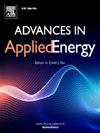Integrating water availability for electrolysis into energy system modeling
IF 13.8
Q1 ENERGY & FUELS
引用次数: 0
Abstract
In recent years, temperature records have been broken all over the world and the global temperature keeps rising. As a result, fresh water availability will diminish ever more and more due to droughts and extreme weather events. Water is a key part of many central aspects of life but will also become important in the future for electrolysis to synthesize hydrogen, a promising energy carrier in energy systems for the transition from fossil to renewable energy. Current energy system optimization models neglect water as an input for electrolysis when focusing on electricity. In this study, we present a method for implementing water as an input in energy system optimization models, with constraints for freshwater availability and seawater processing. We apply our method to one scenario and investigate the impact on the European energy system with highly-detailed spatial and temporal resolutions. The results indicate a relocation of electrolysis capacities of 10% and an increase of methane imports and methanation capacities. The effects suggest that water should be considered in energy system optimization in the future.
将电解用水纳入能源系统建模
近年来,世界各地的气温记录不断被打破,全球气温持续上升。因此,由于干旱和极端天气事件,淡水供应将越来越少。水是生命许多核心方面的关键部分,但在未来也将成为电解合成氢的重要组成部分,氢是能源系统中从化石能源向可再生能源过渡的一种有前途的能源载体。当前的能源系统优化模型在关注电力时忽略了水作为电解的输入。在这项研究中,我们提出了一种将水作为能源系统优化模型的输入的方法,并对淡水可用性和海水处理进行了约束。我们将我们的方法应用于一个场景,并以非常详细的空间和时间分辨率调查对欧洲能源系统的影响。结果表明,电解能力将迁移10%,甲烷进口量和甲烷化能力将增加。这些结果表明,在未来的能源系统优化中应考虑水。
本文章由计算机程序翻译,如有差异,请以英文原文为准。
求助全文
约1分钟内获得全文
求助全文

 求助内容:
求助内容: 应助结果提醒方式:
应助结果提醒方式:


